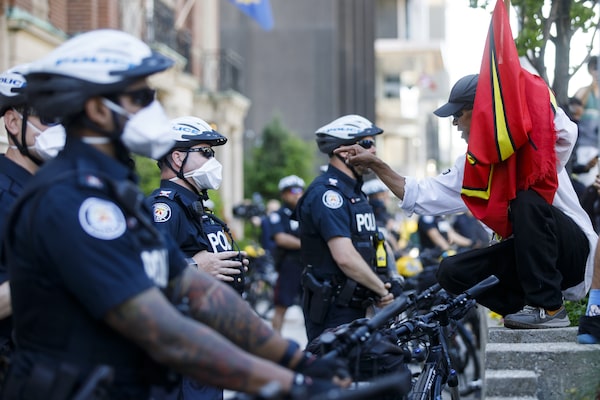
A protester confronts a Toronto Police officer during an anti-racism march on June 6, 2020, in Toronto.Cole Burston/Getty Images
Toronto Mayor John Tory is calling for an expansion of police mental-health crisis teams, more anti-racism training for officers and the public release of the service’s line-by-line budget in a new package of proposed changes prompted by recent protests.
The proposals were released on Wednesday, amid calls to “defund” police forces over anti-Black violence and the demand from some on Toronto City Council to chop 10 per cent out of next year’s police budget. The Toronto Police Services Board is to consider them on Friday.
Mr. Tory stressed that the proposed moves, contained in a motion put forward by Toronto Police Services Board chairman Jim Hart, were just first steps. The mayor said he would also be supporting other calls for reform later this month at council, arguing there is now an “unprecedented consensus” on confronting anti-Black racism.
The proposals call for the “urgent” expansion of the police service’s mobile crisis intervention teams, which pair specially trained officers with mental-health nurses to deal with people in distress. They operate with limited hours and only have the resources to respond to about a quarter of such calls, which total more than 30,000 a year.
The motion says money to expand the teams “to meet current service demands” must be found within the existing $1.22-billion police budget or its reserves. But it also directs police to work with the city to come up with a new model that would see all calls involving people in mental distress handled by teams of mental-health professionals instead of police, unless there are “significant safety issues.” If agreed upon, the proposal says, that new model could make use of funding now directed to the police.
Mr. Tory acknowledged too little has been done to expand these mobile crisis teams: “The fact is, it’s been too modest, because we’re seeing that too many cases of people in crisis end in tragedy of one kind or another, including people losing their lives. And that has included a disproportionate number of people from racialized communities who lose their lives in these kinds of episodes.”
Recently, activists have demanded answers about the case of Regis Korchinski-Paquet, a 29-year-old Black woman who fell from a high-rise balcony after Toronto Police were called to her apartment. Family members say police were told she was in mental distress. The province’s Special Investigations Unit is probing her death.
The proposals direct the chief to make public a “line-by-line breakdown” of the service’s budget and its yearly budget requests. This echoes a demand in a city council motion being moved by Councillor Josh Matlow that also calls for a 10-per-cent cut to the police budget and is to be debated later this month. City councillors have long criticized the police budget as opaque and demanded broader oversight.
The proposals released Wednesday also call on the chief to create a new “Ethics, Inclusivity and Human Rights” training course that would be mandatory every two years for all members of the police service, both civilian staff and uniformed officers.
It would cover anti-racism – and specifically anti-Black and anti-Indigenous racism – “bias avoidance,” LGBTQ issues and “intersectionality” (the way social groupings such as race, class, and gender overlap), as well as ethics in policing. The course would be kept up-to-date with input from the City of Toronto’s Confronting Anti-Black Racism unit. Current anti-Black racism retraining courses for police would also be made permanent and studied for possible expansion.
Instruction for recruits would be reviewed to determine how anti-racism training could be included in all courses taught at the Toronto Police College, and to look at co-developing new material led by members of marginalized communities.
Akwasi Owusu-Bempah, an assistant professor of sociology at the University of Toronto whose research focuses on the issues of race and the justice system, said the proposals do not address the defund movement’s demands that many duties be removed from police and handed to other services.
“To me, this is the police engaging in protectionism,” Dr. Owusu-Bempah said. “They are trying to reallocate funds within their budgets to address the calls and concerns of members of the public.”
Mr. Matlow said he is happy the mayor has responded to his call for a transparent police budget. But he said the mayor’s proposals do not do anything to reduce the size of the bill for policing, and he dismissed the proposal to study the establishment of a new mental crisis service as too slow.
“It sounds like they are hoping this all fizzles away by the time they actually get around to doing it,” he said. “The pressure is now, and we are being asked to meet the moment. This doesn’t meet the moment.”
Our Morning Update and Evening Update newsletters are written by Globe editors, giving you a concise summary of the day’s most important headlines. Sign up today.
 Jeff Gray
Jeff Gray